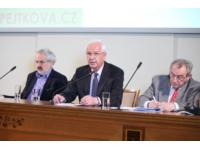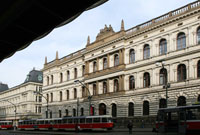
Working Conference at the Headquarters of the ASCR
The figure of Václav Havel as a publically engaged intellectual was the subject of a conference held by the Institute for Contemporary History (ÚSD) of the ASCR on Monday, 19 March 2012 at the Headquarters of the ASCR in Prague. It was attended by a number of historians and other experts from the ASCR as well as from other institutions. According to the director of the ÚSD, ASCR, PhDr. Oldřich Tůma, PhD., two main reasons led to the organisation of the conference – the motif of the symbolic farewell to Václav Havel and venerating his memory and then on the working level an attempt for an objective and unbiased formulation or at least a preliminary definition of the ground plan of what V. Havel means for Czech society and its history.
Oldřich Tůma also stated that the conference focuses on the knotty issues of Havel’s activity,
but it does not capture his literary production. He observed that Václav Havel has his admirers and
opponents. People have various opinions on his personality, but they agree that he influenced Czech
society like few others. The director of the ÚSD, ASCR also mentioned that further discussion which
will go into more depth will build on this first conference eon Havel.
In the opening block, also the President of the ASCR Prof Jiří Drahoš appeared. As he
said, it is understandable that Havel’s opinions and decisions were often not perceived and
accepted unambiguously. ‘The evaluation of his importance in civic and creative engagement in
various stages of the existence of the communist regime, within the formation of the wide
opposition movement Charta 77 or his role in the domino effect of the collapse of the communist
bloc at the end of the 1980s is still a great appeal for interdisciplinary reflection and research
interest,’ emphasised Prof Jiří Drahoš. In his opinion, however, this appeal represents also more
than thirteen years when Václav Havel was involved as the head of state in the adoption of these
most important decisions, which contributed after 1989 in the assertion of the fundamentals of
pluralistic democracy and the launching of the transformations of politics, economics and
public life in general.
The morning block of the one-day conference offered for discussion a view of the foundations
of Havel’s thought and concepts, whose reflection can be observed in his essay production as well
as in his practical actions. The two afternoon blocks were devoted to views of Havel’s public
activity from the 1950s to 1990s, the period role and meanings of this activity and also his
long-term influence on contemporary society and politics. The concluding appearance approached
Václav Havel in the context of oral-historical research.
PROGRAM OF THE CONFERENCE
Ceremonial Opening of the Conference
Introduction by Prof Jiří Drahoš, President of the ASCR
Vilém Prečan (ČSDS): Notes on the complex project of Havel Studies
Morning Block: VÁCLAV HAVEL JAKO VEŘEJNĚ ANGAŽOVANÝ INTELEKTUÁL
Tomáš Hermann: Philosophical inspiration in the thought of Václav Havel
Jiří Suk: The political thought of Václav Havel
Jan Pauer (Hamburg): Václav Havel: Considerations on morality under the conditions of a
dictatorship
Oldřich Tůma: Václav Havel as an analyst of the functioning of the communist regime
1st Afternoon Block: VÁCLAV HAVEL V OPOZICI A DISENTU
Libor Vodička (ÚČL): The beginnings of the public activity of Václav Havel: Theatrical and
Literary Criticism (1956–1967)
Jiří Hoppe: Havel’s 68
Jaroslav Cuhra: Václav Havel and his role in the opposition
2nd Afternoon Block: VÁCLAV HAVEL V POLITICE A SPOLEČNOSTI PO ROCE 1989
Marie Černá: Dear Fellow Citizens! The Memory of Communism in Havel’s Speeches
Adéla Gjuričová: Václav Havel and the Federal Assembly (1989–1992)
Michal Kopeček: Antipolitics and its legacy in the era of neo-liberalism
Miroslav Vaněk: ‘Without oral history, many things would remain forgotten...’ Václav
Havel
in the analysis and interpretation of oral history or on the complexity of the research of the
political elites
Photo by: Stanislava Kyselová, Akademický bulletin
Prepared by: Institute of Contemporary History of the ASCR and Department of Media Communication
of the Head Office of the ASCR
20 Mar 2012









